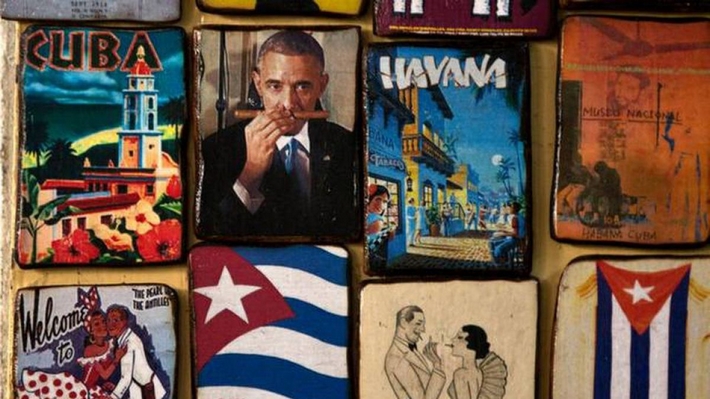
Cuba and the audacity of hope
Last week, White House Chief of Staff Denis McDonough offered a teaser about the year ahead: He said, “We’ll do audacious executive actions throughout the course of the year, I am confident of that,” in comments reported by The Hill.
We can’t say what those executive actions involve since “McDonough did not hint on which areas the president will sidestep Congress and set policy on his own.” Since, however, Congress may not act, and there’s much within the President’s power to expand on the new policy, and to trim back on the old, we hope Cuba’s on the agenda.
Trim back on the old? As we have said before, if President Obama’s new direction in Cuba policy were like a painting, it would be more like pentimento than an entirely new piece of work. This is when traces of an underlying image become visible despite the top layers of more recently applied paint. In seeing such a painting, the viewer must ask her or himself whether the artist changed his mind thoroughly, or if the old parts peeking through suggest indecision present in the artist’s mind.
Yesterday, USAID published a notice reminding us – and we thank Tracey Eaton, the journalist who brought it to our attention – that the U.S. government is still funding activities with regime-change money under programs enacted by Congress to overthrow Cuba’s government, despite the renewal of diplomatic relations.
Dressed up as “humanitarian assistance to political prisoners and their families, and politically marginalized individuals and groups in Cuba,” Tracey underscores the circular reasoning on which the $6 million grant program is based. He cuts to the core in his typically genteel way:
“I think it’s worth pointing out that many of those arrested for political reasons are taking part in programs funded by the U.S. government or U.S. government-financed organizations. I am not arguing for or against such programs or saying there are no human rights violations in Cuba, but I find it interesting that existing U.S. government programs are used to help justify and fuel the need for new programs.” [our emphasis]
The timing – and of course the substance – of this announcement is really telling. This declaration, and it’s not the first, that the U.S. is still in the regime change business comes one month to the day after the USAID Inspector General released a sharply critical report on how the agency’s recently-exposed debacles raised serious legal and regulatory questions about how these programs are administered.
The IG report focused on the faux twitter program, ZunZuneo, which “was secretly created to stir unrest and raised concerns about the legality and covert nature of the project,” and another effort in which an HIV prevention workshop was used as “a guise to recruit young Cubans to anti-government activism” and how it “undermined the credibility of USAID’s health work around the world.”
Note and reminder: the existence of both programs was brought to light by excellent investigative reporting by the Associated Press.
Just these two programs, the IG reported, were plagued by conflicts of interest (a fancy, high-dollar contract was awarded to a grantee’s family member without competition) and needlessly high expenses. Because these efforts were undertaken covertly to prevent the Cuban government from detecting or disrupting them, excessive secrecy led to the creation of bank accounts to place agency money in the Cayman Islands, and to practices that concealed to Cuban participants the knowledge that they were involved in programs funded by regime change dollars.
But, their government did find out. The IG determined that the programs lacked safeguards to prevent them from being penetrated by the Cuban government and subverted by Cuban intelligence, and left Cubans participating in the programs vulnerable to being denigrated and threatened.
So, it’s reasonable to ask – did USAID take any of the IG’s findings on board, or is it happening again? There’s language in yesterday’s new announcement – “the primary goal of the program,” USAID seeks creative and innovative approaches in the design and delivery of the monies – that begged questions about what is really being funded.
Tellingly, USAID did offer cautions informed by Alan Gross’s arrest – to avoid the use of American citizens, recruit personnel who are fluent in Spanish and who’ve worked in Cuba before, and make it clear that recipients can’t sue USAID if they are caught, injured or killed (literally) – suggesting that something bigger is afoot than the delivery of humanitarian assistance.
Undoubtedly, there’s a regime change devotee in the USAID bureaucracy ready to dismiss these legitimate questions with the pettifoggery that we heard from the agency when ZunZuneo and the ‘not-really-an HIV-workshop’ debacles were first exposed. Then, the audacity of deceit ruled the day.
So, yes, we’d favor a long list of executive actions to increase travel and trade with Cuba, especially ones that free U.S.-Cuba commerce from the shadow of excess enforcement stemming from the old policy.
But, we’d like to see more. From the outset, President Obama’s new direction in Cuba policy was predicated on the idea that it does not serve America’s interests, or the Cuban people, to try and push Cuba toward collapse.
In 2016, is it too audacious for the President to cut the funding for – or at least reform – these efforts, so that the entire government, including USAID, speaks with one, clear voice when it comes to engaging with Cuba during his last year in office?


